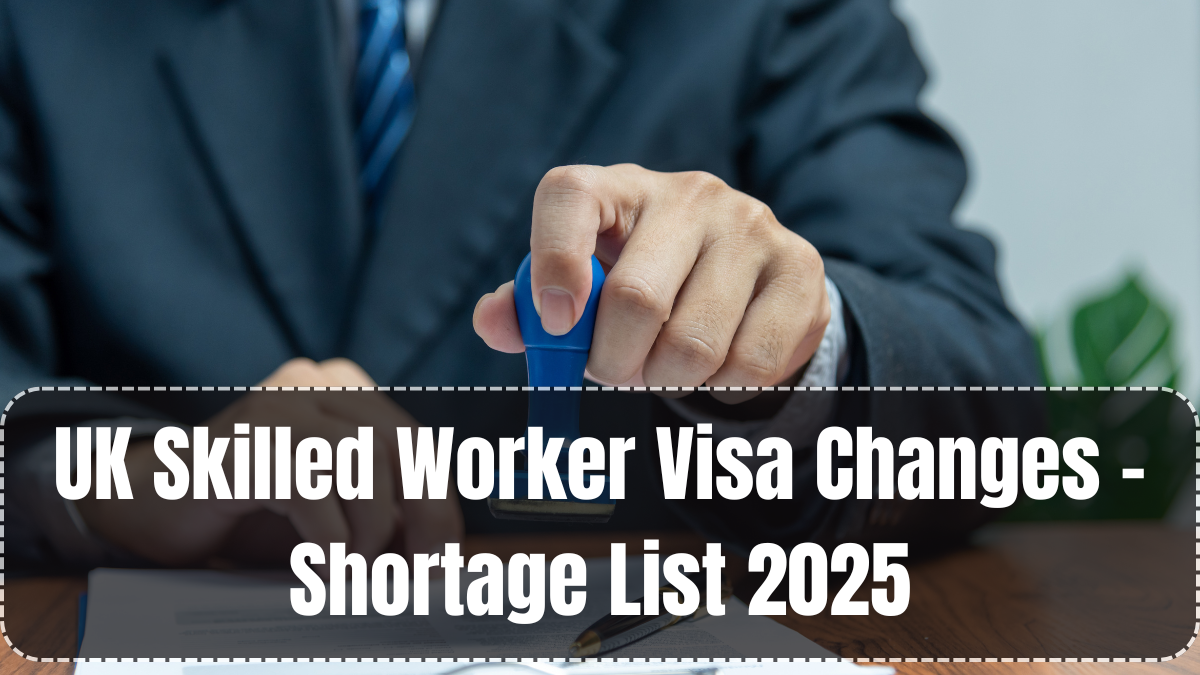The UK Work Visa Changes 2025 have introduced significant updates to the Skilled Worker route, impacting thousands of job seekers, employers, and visa applicants worldwide. These changes primarily focus on redefining the Shortage Occupation List (SOL), increasing minimum salary thresholds, and enforcing stricter compliance measures for employers and applicants.
With Brexit well behind, the UK is now refining its immigration strategy to balance domestic labor needs with economic growth. The 2025 reforms are part of the UK government’s long-term vision to attract high-quality talent, especially in healthcare, construction, engineering, and IT sectors.
This article provides a full breakdown of the latest updates and what they mean for those seeking work visas to the UK this year.

Updated Shortage Occupation List (SOL)
One of the major highlights of the UK Work Visa Changes 2025 is the updated Shortage Occupation List, which now includes several new job categories and removes others no longer in short supply.
Newly added occupations:
-
Bricklayers and Masons
-
Care Workers and Home Carers
-
Senior Carers
-
Laboratory Technicians
-
Civil Engineers (all specializations)
-
Software Developers and Programmers
-
Butchers and Meat Process Workers
Removed occupations:
-
Chefs (with some exceptions)
-
Welding trades not tied to construction or shipbuilding
-
Secondary school teachers (non-STEM subjects)
Being listed under SOL means that applicants may benefit from:
-
Lower visa application fees
-
Reduced minimum salary thresholds
-
Relaxed English language requirements in some cases
The changes reflect evolving demands in the UK labor market and aim to fill essential skill gaps quickly.
New Salary Thresholds for Skilled Worker Visas
The 2025 reforms have introduced revised salary thresholds across industries, affecting eligibility for Skilled Worker visas. The general threshold has been increased to:
-
£29,000 per annum or £14.10/hour for general roles
-
£23,200 per annum or £11.90/hour for shortage list occupations
-
£20,960 per annum for new entrants under the age of 26 or recent graduates
Employers sponsoring workers under the new SOL must still ensure that job roles meet the standard salary benchmarks for their sector and are not offering below-market wages.
These changes ensure that the system is attractive to highly skilled professionals while protecting domestic wage standards.
Streamlined Application Process for Health & Care Workers
The Health and Care Worker visa continues to receive special attention in 2025, with further simplifications introduced. The application process is now:
-
Fully online, including biometric submission in many countries
-
Processed in under 15 working days for healthcare applicants
-
Supported by NHS and approved private health providers
-
Exempt from the Immigration Health Surcharge (IHS)
Eligible roles include nurses, social workers, physiotherapists, paramedics, and midwives. The government aims to fill over 50,000 healthcare vacancies by year-end through this route.
The UK Work Visa Changes 2025 prioritize critical sector demands while easing the process for global professionals.
Points-Based System: Key Criteria in 2025
The Skilled Worker visa route continues to operate under the UK’s Points-Based Immigration System. Applicants must score 70 points, which include:
-
50 points for a job offer from a licensed UK sponsor
-
20 points for meeting the salary threshold
-
Optional tradeable points for shortage occupations, PhD qualifications, or age (new entrants)
In 2025, an additional 5 points are awarded for roles based in “Levelling-Up Priority Areas” such as the North East, Midlands, and Wales, encouraging regional balance in migration.
Applicants are advised to double-check that the job code matches the Home Office’s revised 2025 job classification list.
Employer Responsibilities & Sponsorship Reforms
Employers sponsoring skilled workers in 2025 are subject to tighter compliance rules:
-
Annual license renewal for sponsors is now mandatory
-
Digital Right to Work Checks have been expanded
-
Employers must report job changes, promotions, or exits within 10 days
-
Misuse of sponsorship rights may lead to license suspension
These stricter controls aim to prevent misuse of the visa system and protect both domestic job seekers and foreign workers from exploitation.
The UK Work Visa Changes 2025 require all businesses to upgrade their internal HR and compliance processes to meet Home Office expectations.
Immigration Trends and Future Impact
According to the UK Home Office’s Q2 report (July 2025), there has been:
-
A 9% increase in skilled worker visa applications compared to the same time in 2024
-
Over 60% of visa grants going to applicants in healthcare, IT, and construction
-
Rise in applicants from India, Nigeria, Philippines, and South Africa
These trends confirm that the UK continues to be a top destination for global talent, especially as the visa process becomes more sector-specific and streamlined.
FAQs
What are the main UK work visa changes in 2025?
Key changes include a revised Shortage Occupation List, increased salary thresholds, faster processing for healthcare roles, and tighter employer compliance requirements.
How does the new Shortage Occupation List benefit applicants?
It allows lower salary thresholds, reduced visa fees, and a slightly easier English requirement in some cases — making it easier to qualify.
Can I apply for a UK Skilled Worker visa with a job offer in 2025?
Yes. A valid job offer from a UK-licensed sponsor in an eligible role is required. Meeting salary and language conditions is also necessary.
Are care workers still eligible under the 2025 visa scheme?
Yes. Care workers and senior carers are on the updated shortage list and continue to benefit from relaxed salary and visa conditions.
What happens if my occupation was removed from the Shortage List?
You may still be eligible under the general Skilled Worker route, but you’ll need to meet the standard salary threshold and other criteria without shortage-based concessions.
Click here to know more.
